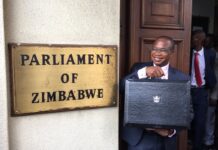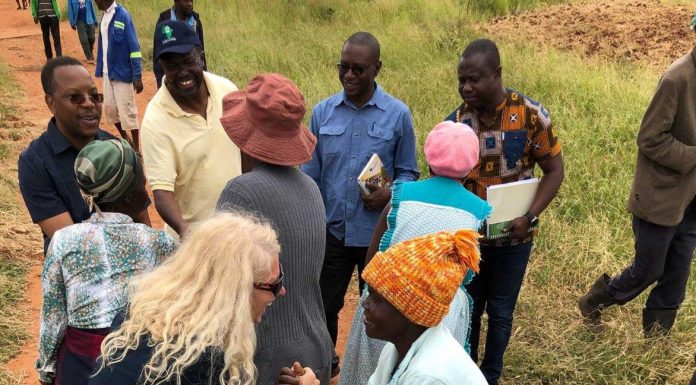
Nhau Mangirazi & Sydney Kawadza
The International Organization for Migrants is rolling out a programme targeted at supporting informal cross border traders who have been severely affected by the COVID-19 pandemic.
Informal cross border traders contribute approximately US$17 billion to trade in the SADC region.
The traders have, however, had their businesses abruptly stopped after the COVID-19 pandemic ravished the world with authorities closing down their borders to outside travelers.
Government have also imposed internal lockdown measures barring inter-city travel when cases rise leaving informal traders with no choice but to resort to unorthodox means to survive.
The desperate measures adopted by the informal traders have also exposed them to the risk of contracting the deadly virus leading to death in some cases.
However, in supporting informal cross border traders in Southern Africa to do Business Safely during the COVID-19 Pandemic, the IOM is training various stakeholders including rolling-out of Training Manual for Border Officials and Small-Scale Traders and linking the traders to financial institutions.
The project, entitled Supporting Informal Cross-border Traders in Southern Africa to do Business Safely during the COVID-19 Pandemic, is targeting stakeholders in Chirundu and Beitbridge.
The project is being managed by the IOM office in Zambia, and implemented in conjunction with IOM missions in Malawi, South Africa, and Zimbabwe and is funded by the Foreign, Commonwealth and Development Office (FCDO) of the United Kingdom.
“The project has been necessitated by the outbreak of the COVID-19 pandemic which has impacted negatively on world trade, including in Southern Africa. العاب من النت
“The outbreak of COVID-19 in Southern Africa has led to border closures and travel restrictions throughout the region. Where cross-border trade is permitted, it has been for larger commercial flows and not for the movement of people, accompanied by quarantine measures for varying periods, often at the cost of the traveller,” the IOM said.
The organization also noted that authorities had also put in place additional security measures to patrol borders.
“For ICBTs, these changes have had a significant negative impact on their livelihoods as they are unable to conduct their trade normally. COVID-19 restrictions have hit informal trade harder than other sectors, with women hit particularly hard by economic losses. عجلة الروليت
“There is likely to be further pressure on the informal sector post-COVID-19. كيف تلعب الدومينو The importance of ICBT in the SADC region cannot be over-emphasized.”
ICBT accounts for between 30-40 percent of total intra-SADC trade, with an estimated value of US$17.6 billion.
At least 70 percent of informal traders are women who face gender specific risks, are more susceptible to harassment and exploitation by corrupt officials in addition to hurdles faced by all traders.
“It is therefore very important that ICBT continues to flow with as little disruption as possible as it contributes significantly to livelihoods within the SADC region,” the IOM said.
The organization said the project was aimed at contributing towards the enhanced protection of the health and economic rights of ICBTs through the facilitation of continued trade during the COVID 19 pandemic.
“The expected outcomes of the project are to ensure that consensus exists on policy direction to favourably incorporate ICBT and informal traders into national COVID-19 trade plans and to the extent possible, preparing for the COVID-19 socio-economic recovery plans.
“It also seeks to make sure that Border Control Posts and border officials have improved capacity to facilitate a healthier and safer environment for informal cross-border traders to operate.”
It further seeks to make sure that small scale cross border traders and ICBTs demonstrate increased ability on how to trade safely and operate at BCP during restrictions brought about as a consequence of COVID-19.
The workshop, being held virtually, aims at making sure that border officials have access to correct information and implement operational guidance on COVID-19 including infection prevention control among ICBTs.
“To achieve this objective, the workshop will roll-out the gender mainstreamed training package on informal trade measures, and infection prevention and detection and referral of ill passengers for frontline border officials,” the IOM said.
The rolling-out the gender mainstreamed training package on infection prevention and safe trade for small scale cross-border traders is expected to increase their capacity to trade safely and operate at borders during COVID-19 response.
ICBTs are also expected to link up to initiatives and service providers that can help them re-capitalize on lost investment and lack of revenue until borders are open and they are able to recommence trade
Expected outputs include an increased awareness by border officials on health and safety, informal trader’s rights and responsibility, as well as the capacity to train colleagues using the training package.
The workshop is also expected to ensure increased knowledge by CBTA members on trade issues, health and safety, rights and responsibilities associated with informality and movement outside of official BCPs, as well as the capacity to train colleagues using the training package.
The IOM also expects an increase in knowledge of ICBTs with regards to financial institutions that can help them re-capitalize on lost investment and lack of revenue.










